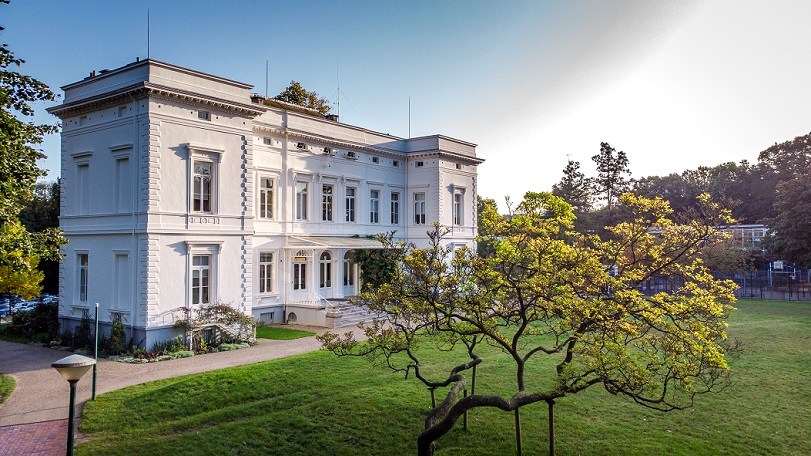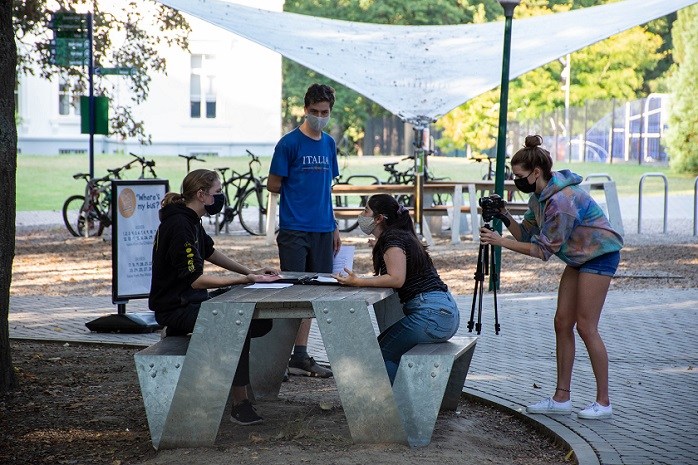On March 10, 2020, the International School of Brussels (ISB) closed its campus as a result of the Covid-19 pandemic. Thirty-six hours later, 1400 students across all grade levels had successfully transitioned to continuous learning, beginning a new way of doing school that would impact the remainder of the 2019-20 school year.
Like many other international schools in Brussels and around the world, a conversation soon began, not just about how our students were now learning, but also about what we were learning in the face of this unprecedented crisis. What were we learning from all of the feedback that we were gathering from students, parents and teachers across the school? How was this disruption shifting our thinking about what school is for, both now and into the future?
When ISB welcomed all students and staff back to campus in August, the familiar beauty of the Chateau against the backdrop of the Forêt de Soignes felt like a homecoming. Even with masks and new protocols and routines, there was a tangible sense of joy in the air. We had returned.
https://resources.finalsite.net/videos/t_video_mp4_720/v1587554511/isb/tix3vi5zhz240jq1siie/Wewillcomebacksoon.mp4
The truth is, however, we were not the same. New priorities had emerged, new lessons had been learned, and a new chapter in the school’s history was already well underway.
During the lockdown, we learned that...
● the quality of our teachers and infrastructure allowed us to adapt quickly
● our programmes in the arts, creativity and health sustained our community during this time
● the relationship between students and staff is critical to the quality of learning
● there is no substitute for being physically present on our amazing campus
● we have the capacity and vision to move learning to an exciting new phase in our school's illustrious history.
The wellbeing of our community is our first priority
This year is all about safety first. And that doesn’t just mean having the right infrastructure and protocols in place to protect individuals from Covid-19. It also means keeping a constant eye on the social and emotional needs of all members of the ISB community and releasing the resources to provide support where necessary. It means being prepared to help students, teachers and parents over the long term, rather than quick fixes. It means always learning from previous experience and constantly evolving; adapting the learning programme - whether on campus or virtual - to an ever-changing situation.
“As we started the new school year, we were delighted to see that our enrolment was up and that a number of families joining the school specifically cited our reputation in handling the crisis, as well as the robustness of our distance learning programme, as key to their decision.”
David Willows, ISB Director of Advancement
Envisioning a future, grounded in our mission
ISB is widely respected as being a leader in the field of international education, and for almost 20 years now, Everyone Included, Everyone Challenged, Everyone Successful has guided the school in all aspects of community life, learning and operations. Our mission is more than something we say, it is part of our DNA.
We are proud of how far we’ve come, but it’s now time to envision the next stage in our journey. We know already that many of our students feel like ISB is a place where they can be remarkable. We know that a large percentage of our students graduate each year from ISB to attend one of the world’s top universities. We also know that many of our students, even years after they have left the school, feel deeply connected to ISB and grateful for the impact that the school had upon their future lives.
Covid-19 allowed us to demonstrate that dramatic educational change can be achieved with agility and conviction. It provides us with the imperative to imagine a school in which every student is challenged to find their remarkable; a school in which students monitor and track their growth with a truly individualised learning plan.
“This is a time to be future-focused and consider what we need to do differently. New conversations are taking place about our exciting ambitions for our students and ways we can empower them to play a more active role in determining their own futures. We are also setting in place robust and coherent systems that will accelerate us along the path of fulfilling our mission of inclusion, challenge, and success for every student.”
James MacDonald, ISB Director
At the end of 2019, ISB was reaccredited by the Council of International Schools, in many areas exceeding standards that have been set for schools around the world. In their concluding remarks, it was noted that "ISB is at an exciting phase in its history. The future steps it takes could have echoes and ramifications beyond what it, and any of us, can imagine.” Nearly one year on, no one could have predicted the situation that we would find ourselves in. But the lessons learned over the past months are now very much shaping this future.
For more information about ISB, visit our website or contact admissions@isb.be
Top 5 reasons families choose ISB and 3 reasons why they don’t
Each year, hundreds of families inquire about the possibility of their children joining our school. During this process, we routinely ask families what is important to them. We want to listen to why they choose ISB and even why they don’t. Here’s what they tell us.
Top 5 reasons families choose ISB...
1. The quality, dedication and commitment of our teaching faculty to every student.
2. The strength and depth of the academic programme throughout the school, leading to extensive options in the High School in both the IB Diploma programme and new IB Careers-related programme.
3. The school’s global reputation as an outstanding learning community, built upon a powerful mission of inclusion, challenge, and success.
4. Our world-class learning support programme, supporting a diverse range of learners in all grades.
5. The school’s campus and facilities, which also provides an opportunity for students to excel in the arts, athletics and other after-school activities.
… and 3 reasons why they don’t.
1. Some families are looking for a school closer to where they live.
2. Some families are unable to cover the cost of Tuition and are not eligible to apply for an Assisted Place.
3. Some families are looking for a school with a different, often more traditional, approach to teaching and learning.


